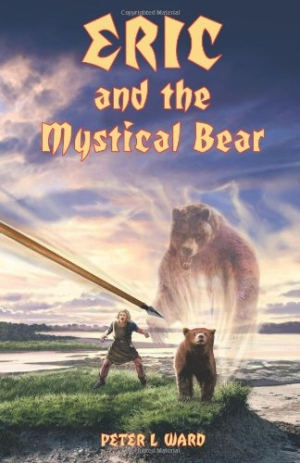Eric and the Mystical Bear
Throughout the first two volumes of the Vimp the Viking trilogy, Eric Bignose has been the strongest of the young group of Vikings, a capable shipbuilder, and a sailor without whom the group’s adventures may well have come to an early end. So it’s fitting that in this final volume, Eric and the Mystical Bear, he takes center stage. While in the forest he sees a mother bear killed by a terrifying beast. He adopts her orphaned cub, naming it Beowulf. As it turns out, his confrontation with the mythical beast, known as the Black Shuck, brings a curse down upon the village and Eric is banished. He and the bear seek safety in the wild.
While Eric constructs a shelter, at the same time he begins teaching Beowulf to fend for himself so he can return to his natural habitat. Meanwhile, Eric’s friends, especially his beloved Astrid, are devastated by his loss and are determined to reunite with him. After they set out to find him they are met by a number of threats, from a sea witch who controls a dangerous whirlpool to mermaids who capsize their boat and imprison them in a sea cave. To escape will require not just great strength, but help from the outside.
This final volume resolves the series nicely. The undersea escape itself is a thriller with unexpected twists. Steve Crisp provides great illustrations that capture both the grandiosity of the gods as well as the humble domestic moments of village life. Peter L. Ward proceeded to take bigger chances with each volume in the trilogy. Here, the group of protagonists labor to get home, only to discover that the village they left is no longer there, having been sacked and overtaken. Amid all the myths and legends there’s a sadness running through the story. Loss of home and family are deeply felt. Despite this, there is a happy ending, of sorts, and an epilogue that leaves readers with a sense of how things turned out for everyone. The author does a good job of tying up loose ends.
As with the first two books, Eric and the Mystical Bear would have benefited from additional line editing for punctuation, spelling, and consistent use of language. There are a few times when a sentence seems to have been cut off and grafted onto the back of another, and some scenes where Beowulf’s whereabouts are dangerously vague.
Ward has written for children’s television and published a well-reviewed book about Charles Darwin for young readers. He created this series out of a concern that young boys were reading less, and the Vimp books certainly have the potential to capture their imagination. Overall, Eric and the Mystical Bear is a fine story, even though it is dotted with many “eats, shoots, and leaves” moments.
Ward is still to be commended for creating a series that has improved with each volume, one built around a strong moral center. The young Vikings unite because they no longer want to fight; by the end of the story, their families have also seen that plunder leads to plunder and are trying to change their ways. The young characters go to great lengths to do good turns to animals, and on more than one occasion an animal returns the favor. The book serves as a good golden-rule message for young readers to absorb. The series has flaws, but it’s big-hearted and ambitious. With careful editing it could be truly great.
Reviewed by
Heather Seggel
Disclosure: This article is not an endorsement, but a review. The publisher of this book provided free copies of the book and paid a small fee to have their book reviewed by a professional reviewer. Foreword Reviews and Clarion Reviews make no guarantee that the publisher will receive a positive review. Foreword Magazine, Inc. is disclosing this in accordance with the Federal Trade Commission’s 16 CFR, Part 255.

